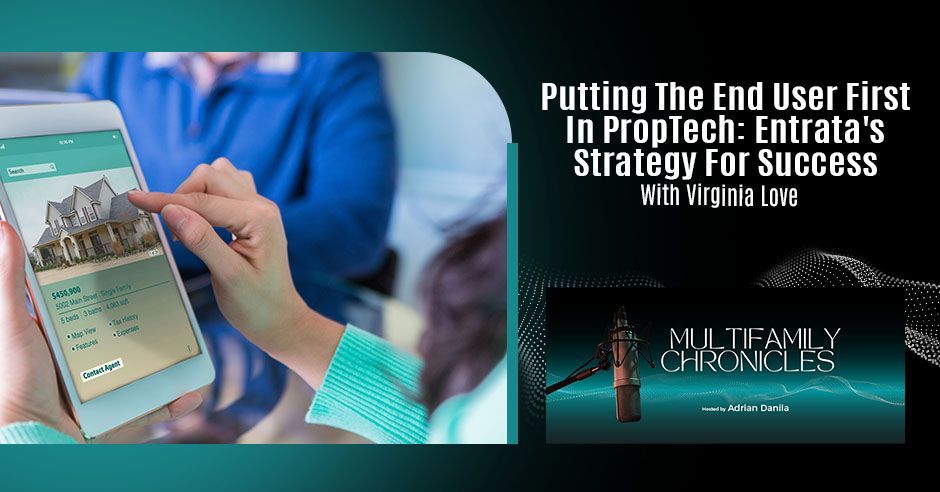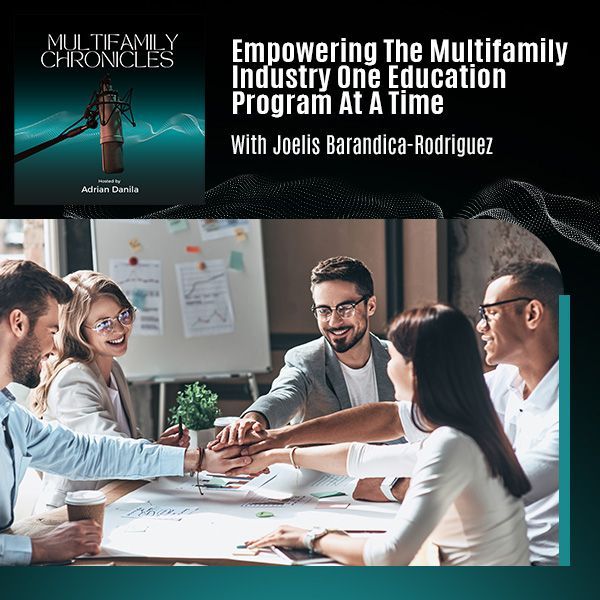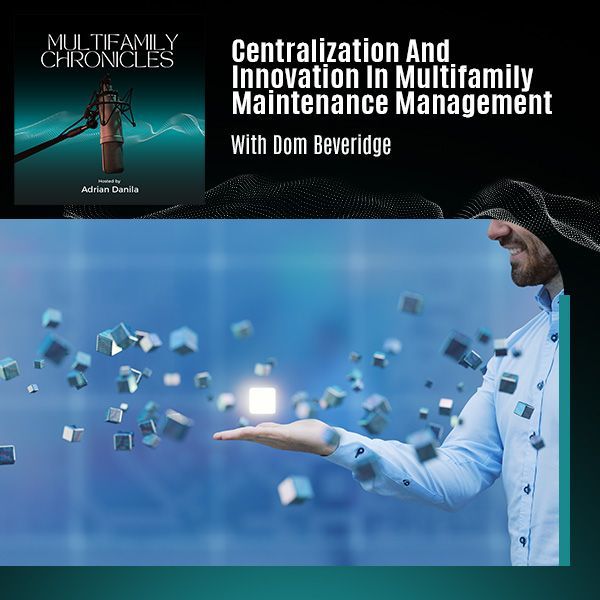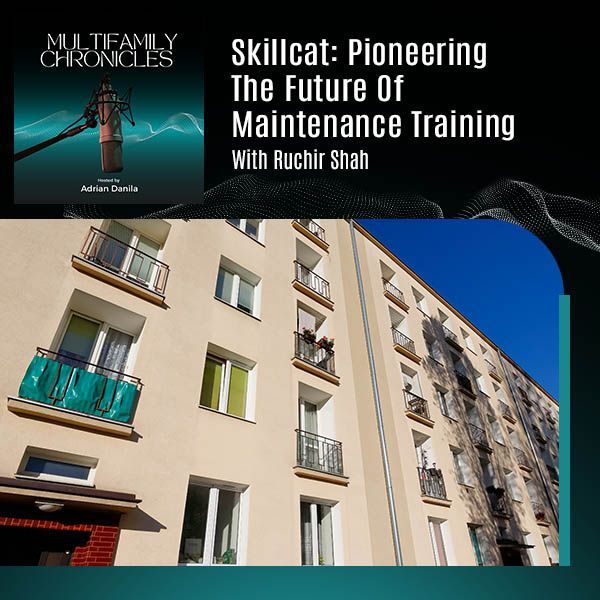Putting The End User First In PropTech: Entrata's Strategy For Success With Virginia Love
By prioritizing the needs of the end user, companies can build strong relationships, push their products, and create winning strategies in the PropTech industry. As we look ahead to 2023 and beyond, it's important for companies to focus on the key factors that will make management companies a viable partner and stay customer-centric. In this episode,
Virginia Love, an Industry Principal at
Entrata, shares her inspiring journey to joining the company. Virginia discusses whether it's valuable for companies to hire industry influencers and how these influencers can help push products and build relationships. She also provides insights into Entrata's unique strategy that prioritizes the end user's needs and desires over making high-level sales. Virginia shares her thoughts on the PropTech market and what to expect in 2023. She explains that it could be a very difficult year for companies, especially PropTech. She also reveals the most important thing that PropTech companies must bring to the table to be a viable partner for management companies in 2023. Tune in and learn winning strategies for future market trends and challenges.
---
Watch the episode here
Listen to the podcast here
Putting The End User First In PropTech: Entrata's Strategy For Success With Virginia Love
I have a very special guest right here with me, Virginia Love. Welcome to the show, Virginia.
Thank you so much. I'm so glad to be here.
I'll say at the very beginning that you're an Industry Principal with Entrata to the few audiences that don't know you yet. I would like to start by asking you to tell us a little bit about how you started in the apartment industry and how you landed at Entrata.
Much like a lot of folks that are in the industry, I started on-site. I started as a part-time leasing consultant with Trammell Crow Residential Services or TCRS a million years ago. I followed a friend of mine, Greg Toomey, who started as a leasing consultant. We met a gentleman before our property management life. He's like, "Do you want to be leasing apartments? You've got a lot of enthusiasm. You're fun. You will like it." Greg went first, and then I followed him as a leasing consultant.
As a lot of folks on-site, you have to work your way up. You go from being a great leasing consultant. The only way that you can get to be an assistant manager or regional manager is you have to perform. You take somebody out of that sales role that they're so good at. In the industry, you put them behind a desk a lot of times. That's what the assistant manager did back in my day.

I was blessed that I moved to a couple of companies. I ended up working with Summit, which is now Camden, a private owner and developer here in Atlanta. I landed at ING Clarion with Greg Lozinak. I was Training and Marketing Director, and then I was VP. We left that company and went together to Waterton. I was at Waterton for twelve years as Vice President of Leasing and Marketing.
I did what everybody else has done. I worked my way through. What I love about this industry is you can pick something that you like. If you like the accountant or the accounting part, there's an outlet for you if you want to work your way up in a company. If you love the marketing part, the training part, or the business development part, you can identify what it is that you're good at and move that way.
I was a client of Entrata for eight and a half years. We were early adopters back in the property solutions days. I always identified with the brand. I was a big proponent of what they were doing because they were doing something different. Ours is an industry that doesn't particularly like change. When we do think we're going to change, we still want to do it the old way. We acknowledged early on that this group is trying to do something different, and we wanted to be a part of it.
In that relationship, it was Chase Harrington, our President, who said to me, "I've got this great idea. You should come over to Entrata. We will create a role where you bridge marketing, sales, and product. You bring ideas in from the industry. You will help clients, do a lot of speaking, and answer 1,000 questions a day that the developers might not understand about the industry. They know technology." It took almost three years for us to put this together. I say all the time, "It's the best decision I ever made." It has been great.
You're saying something incredibly important to me. You described your journey to joining Entrata. I always ask my guests this. This is not something that we probably discuss, but I wanted to ask you this question. Do you think there's any value for a company in chasing and finding industry influencers so that there's a compatibility between those personalities and the products that they're trying to sell, getting together, joining forces, and helping them push their products and get out there, relationships, and everything that comes with it? Do you think there's any value in hiring industry influencers?
On one of my first days at Entrata, I went out to Utah for the new hire training. Chase called me upstairs, "Can you step into this meeting with a bunch of the engineers and folks from R&D and product?" He was on call, "I know you can help them." I hadn't been on the clock for an hour. I get upstairs, and they had a question. We have all been on calls on demos with new companies. They say something, "The site levels have to push this out." You're like, "It's not going to happen."
They don't know the workflow. They're building something. As soon as they pitch it, folks like me in my old life shut it down. We're like, "This isn't how the business works. You can make the business work a different way but you got to understand how it's working now." I got upstairs to this meeting. What they were having trouble with was a rentable item in the system. They were like, "Why does this client say it's a rentable item but this client isn't?" What they were doing is they were tracking the support tickets.
We made a change when the software was updated. Some people loved the change, and some people didn't like the change in the system. I was like, "Can you can you show it to me?" They pull it up, and I look at it. I was like, "I get it. Why don't you do it like a drop-down menu instead of two fields or whatever the thing was?" They gave me a standing ovation. I came back up, and Chase was like, "You're the best hire ever." I can answer questions quickly because I've been there, and I can think as the client thinks. I also know that no two companies are doing this the same. What's a rentable item at this company may already have been factored in the rent at another company.
To be able to be on the front end, whether we're developing a product, solving a solution, or even getting on the phone with a client and going, "Tell me what the problem is. What are you having trouble doing? Let me see if I can help you vet that out," has been great. It's not any credit of mine 100%. It's all Chase's credit. It was very much at the forefront to think about going, "Let's bring somebody in that knows those daily activities better than we do." I loved it. I've seen other companies hire folks now. It's awesome. It's great.
You're making an excellent point. You have been the client for your entire career prior to Entrata. You're switching and working on the service provider side. You give them that insight that they can't have on their own. It doesn't matter how hard they work because they haven't been in your shoes ever.
They will never find it out. You would stumble across it. Maybe another client or another customer would mention it to you, but it would be hard. They have never done the job. There's a little bit of benefit and being on and doing the job. I have such great respect for the teams on-site. The last couple of years has put the focus back on them, which is fantastic. A big and important thing to us at Entrata is that the end user is able to get their job done. If I can help that on the software side, that's what I want to do.

I love that you mentioned the end user because you anticipated my next question. The next question is not related to what we probably discussed preparing for the show. What's the importance of the end user process of vetting out a PropTech product? How does your company approach it? How do you focus on the end user outside of the high-level sales pitch where you're talking to a CEO, a president of a company, or the VP of operations trying to sell? What's the piece that Entrata brings in that is focused on the end user, not on a high-level sale? I'm curious about what's the strategy there.
You want to get to the person that's signing the contract. That's the ultimate goal. There's that movie, My Big Fat Greek Wedding where the mother says, "The husband is the head of the household but the wife is the neck." The site level is the neck. While they don't necessarily sign contracts, that whole signing of a contract happens at a thousand different levels in this industry. Some regionals have the ability. Some don't. Some managers have the ability. Some don't. You can't even pull all that into one category, but sites have such an influence on what's happening. I say all the time at Entrata, "If we're making it hard for them to do their job or if it's hard to lease an apartment, it's hard to lease an apartment."
We make it difficult, and they start saying, "We can't. It won't. This doesn't work." The most important thing that we do as an industry is to get money in the bank. That's anything that we do. It's deposits, applications, rents, utilities, renewals, and referrals. Everything is putting money in the bank. If we can't make that good for them, then they will pipe up. We hope they do. The end users are the ones that make us better.

What I also think is interesting is this is a B2B-B2C situation. We have a user, and then our user has a user. Everybody touches software. It's not just the accountants, the leasing teams, the managers, or somebody pulling reports. It's your residents. It's other third-party providers that you want to integrate with. It is your prospects. Everybody is looking at it. We're trying to make it easy to lease an apartment, whether you are the customer leasing the apartment or you're our customer who's doing the leasing of the apartment. What makes Entrata completely different is that approach.
We know how important those folks writing the checks and signing the contracts are but what has been great about the site-level teams is we were living in a time when they were doing push-down tech where the corporate office was saying, "This is what you're going to use." I did it. I was the worst at it. I was like, "I found something bright and shiny. I want to use it."
You go to a conference, sign up for a bunch of stuff, sign it all, and push it out on the site. Nothing ever happens because they have too much stuff going on, but now, we're from that push-down tech to a user input environment where so many customers of ours and others in the industry have formed some groups using their site-level teams to say, "You tell us. Where are the gaps? Where are the holes? How can we improve this process? How can we make your job easier?" It has been a long time coming. I know everybody that's on the site is being heard. They want to be able to do their job but want to have efficiencies. They want to make it easy on their customer. That's what we're here to do. That's the problem we're trying to solve.
I'm super excited about two things that you said. You're getting the buy-in from the end user. Your knowledge or your company understands that without the buy-in and without making something that they will like and enjoy using, you're not going to be successful, ultimately, no matter how many high-level sales you make. Focus on creating a frictionless process. In other words, I don't want to be a bump in the road to be on their way to taking the money to the bank. How can I make it so smooth that there are no barriers? I'm going to remove all the barriers. They get the money. The money is in the bank.
The thing about it that is so interesting is even back when I was an operator, we wanted to be paperless. We had LEED-certified buildings. We had all these great programs for sustainability but then you had folks that held on to it, "We have to get their pay." You get somebody to see an apartment. You're doing all that paper. You get rid of brochures. You're doing all your follow-up electronically. They come out and see the apartment. You're using an iPad to do the tour. You're having them fill out the application on the iPad. They're paying electronically, and then it gets down to the approval process.
If you've ever been burned before by somebody lying about their job or how much they get paid, that's one of those things. I do this now. I'm like, "You can't have a contactless and paperless process and ask somebody to give you a piece of paper, ask the site team to scan it, and attach it to their digital file. It will never happen. They're so busy." What you and I are both talking about is you have to bite the bullet, get rid of some of those old processes, stop managing what could go wrong, and manage what's going right.
You have to bite the bullet, get rid of some of those old processes, stop managing what could go wrong, and manage what's going right.
My next question to you is now that you're on the bright side, what do you know that you didn't know prior to joining Entrata?
I laugh all the time. When I joined Entrata, people were like, "You went to the dark side." I'm like, "It's not that dark over here. I've not had a dead body in an apartment. I've not had a tree in a car."
There are no skeletons in the closet.
"It's not that dark. Trust me. You work where people live. You will see some stuff." One of the things I was super guilty about was wanting them to add things to the system. I thought, "You just add a field. I want to be able to track how many people pull into the property in a red car or whatever it is. Add a field so I can put it on the guest card." Now what I know is how much that additional field changes on the back end. It changes reporting for everybody. You have to factor that new field into every report that may include it. I have a far deeper understanding of how the sausage is made.
I was a difficult customer. Chase always says I was 1 of the 2 more difficult customers. He hired the other one too, Steph Fuhrman. He's like, "I did the smart thing and brought you both over." What I loved about finding out about some of this stuff, what I was guilty of, and what I did not know prior to joining Entrata is that everybody is doing things overwhelmingly the same. It's what you call them or the process that you're doing them, but it all goes back to the people on-site and the value that they bring. It's not just training them on doing things one time, which is something I was guilty of but continually training.
It's a hard industry to where if you start working with me, and I train you on something, then I'm counting on you to teach everybody else that comes to the site. If you move jobs, very rarely do we start that over. I'll let them know, and then they will teach everybody else. There are so many teachable moments in the industry. You don't have time for them all, but these companies have a steady training program. They're not only rolling things out and implementing them but then they also have refresher training. They're checking their reports, what's going well, and what's not going well, maybe doing a training on that, and looking at the strengths and the weaknesses that the teams have. They fare a lot better.
The other thing that I learned is this. This was an early meeting I went into with Chase where we had a client that was mad. They were mad because one of the reports wasn't adding up. One of the factors that they were reporting was leases. There were five of them. Chase finally said, "Let me ask you a question. Get out a piece of paper and a pen. Don't look at each other's work." We were having a debate about things. He said, "Don't let anybody see what you're saying. I'm going to ask you a question. When is it a move-in? When is it a lease?" 5 folks had 4 answers.
I was guilty of this now that I look back. We don't all settle on those terms and key performance indicators internally. Everybody is looking at a report and coming up with what it says differently. This was a great meeting. We were at a breakfast. They were like, "What do you mean? It's a lease when they sign the lease." "It's not. It's when they sign the application." "It's not. It's not until they move in and pay rent." They were all debating it. Chase said, "You tell us when it's going to be a lease. What you determine is the lease. That will be what it is. You got to figure that out first." I see that a lot.
Sometimes it's something as simple as what one person is thinking one step is and another person's definition, but I see it so prominently now because I was guilty of it. I did the same dadgum thing. I would think that I knew what I was measuring, and somebody else was not looking at that report the same. A lot of it is about having those open conversations. Take a little time with the folks within your company, "Let's sit down and determine. This is the report we're going to look at for move-ins. This is the one we're going to look at for skips. This is the column we're going to look at for new leases. This is the one we're going to look at for commissions." Make a determination because it could fix a lot of confusion.
This was a brilliant move to realize that we're not talking to one group here but we're talking to a number of tribes. Each is trying to have it their way. We're not going to be able to please them all. It's going to have to be a compromise internally for them to say, "This is the five things that we want."
"These are the key performance indicators that we're going to look at." In my old position, I'm looking at one set of reports because I'm looking at the top of the funnel as a marketer. Somebody else is looking at the property management software or the back end as an accounting person. I'm like, "That number doesn't matter unless this number is right. This is where the data is coming in. This is where it's at its cleanest. When we start sending it down the funnel, it's getting muddier."
We have had some high times. We have been doing well. It's getting a little soft out there. It's not going to be like 2008, but when things get softer, folks start taking a hard look at stuff. I always say that we forgive a multitude of sins in performance when we're going well because we're like, "It's clicking." You don't want to mess up that groove on-site, but now we will get back to the point where everybody is digging into those reports a little bit harder. We're going to see this come up.
2023 is going to be extremely challenging for everybody, especially for PropTech companies because COVID has made us think that for the most part, PropTech is going to be the solution for everything even though it wasn't. Everybody is re-evaluating. There was a lot of money put into building new products to help with the lack of one-on-one interaction.
Now that we're back to meeting in person and everything, they're re-evaluating. They're looking at economies. Things are going soft. Interest rates are high. We can't buy as much as we did. Our deals are getting tighter. Where are we cutting? It's payroll. It's going to be all the expenses. Everything is being scrutinized. It's going to be an extremely challenging year, especially for PropTech. Don't you think so?
I think so too. There's a lot of money out there in PropTech. I love new ideas. I'm a big fan of innovation. I love something new coming to the market that even competes with something that we have. It makes us better. Something pops up every day, but a lot of it has to do with how much more can the site level have on them. Is it going to be a product that's going to require something of them, "All they have to do is tell the prospect to do this. The prospect goes to this. The leasing person has to send us."
I'm like, "It's already dead in the water." They don't have time. They have a lot of responsibility of their own. They have to sell their property, show the property, take care of the residents, and do their social media. It is a lot. We had one deal at Waterton that was $555 million. It's a $555 million deal in Presidential Towers. We put $55 million in rehab. I can't even begin to tell you. I would visit the property and be exhausted by lunch. The pace that they had on that type of property to add something to that property or even to add something for someone who's got 200 units in a rural suburban market is a lot of pressure on them.
The other thing that I will say about PropTech is one of the things that we see is who I was. I was the one that wanted to buy all the shiny and new penny stuff. I go to a conference. I would come back. I'm like. "We have to have it all in marketing." My old boss, Greg Lozinak, used to tell me, "You're a Rottweiler. I'm holding the leash. Find everything we need, and I'll be the one to rein you in."
Nothing is more important as things are getting a little bit tighter, as your teams have a lot more on them, and as people think that there's a ton of tech out there that's going to do a lot of these mundane tasks but your teams still have to manage it. You have to make sure these automated messages or bots are answering the right questions and have the right answer.
There are still people behind all of this, but what is so important is to take a look at that workflow and see where you're doing duplicates. Where do you have two products that do the same thing? I did this with one of our clients when I first got to Entrata. They were like, "We love to say yes. We're a big yes company. We want to do it. We want to be on the forefront of all this new stuff."
I helped them and sat down. I was, "You've got four companies doing self-guided tours." I don't care which one it is. Pick one, do it very well, advertise it, have signs, let your residents know that their friends can take a tour after hours, and market the heck out of it. You have four, and they're not doing any of them because the site is like, "Are we still using that? Are we supposed to do it that way or this way?" Sometimes the only way you will figure that out is if you go and look at your GL codes and see who you're paying because all these bills get paid automatically.
That has been something that I've seen more times than not. Now is the time. Money is tight. We're going to be looking at budgets hard. There are very few controllable expenses in our industry now. You used to control so much. Tech is one of the ones that people feel like they control. Marketing is another one they feel like they can control but not insurance, workman's comp, salaries, taxes, all that stuff, water, and utilities alone. Everybody is going to be looking for every penny.
With that being said, Virginia, what do you think will be the most important thing for a PropTech company to bring to the table to make them a viable partner for management companies in 2023? What would make a management company say, "I want to partner with this PropTech company because I'm getting value." What would make them stand out against everybody else that's out there in a crowd trying to get a business or maintain the current business? What do you think is a thing or two that will make a PropTech company?
I see products come and go. Even before I was at Entrata, I say things like, "Who said that?" That's not that big of a problem. Know the problems that are out there and what you're trying to solve. That sounds easy, but that means you're going to have to do a lot of time. You're going to have to know the property types and the property classes. You're going to have to understand how people staff and train. It's not, "I hear there's a problem with labor. We're going to do a virtual assistant or a chatbot, and that will fix it." You've got to answer the question behind all of that, "What is the role you want this bot or this new piece of automation to do for you?" Have a good understanding there.
Know the problems that are out there and what you're trying to solve.
Everybody is talking about centralization. A lot of times, it's more like consolidating roles. What is great about this is that it elevates the site-level folks. There are folks on-site that are so good at sales that they don't want to be the assistant manager. When I left leasing and became an assistant manager, I made less money because I don't have the commissions that I used to have.
We see centralization as a process. We have a flexible system. They're able to do that within the system. It's not a separate product, but I'm seeing some products that are being introduced that are on those buzzwords, which is great. It's not a problem, but they're answering the buzzword. When you start looking at it, you go, "No two companies want to do centralization the same. It doesn't have a single definition." We see some that are like, "We're going to send all the calls to us and then figure out which one works best. We're going to send it out to the site."
We have other ones like, "We're going to send all the calls to you. You're going to put all the calls together in the CRM. We're going to have people go into the CRM, start talking to people, and then send them out." We have one client that's not even doing any in-person tours. It's only doing virtual tours. They're bringing all the calls in, scheduling, and sending out their salespeople to do the virtual tours. All of these are great and smart solutions, but none of them are the same.
You've got to understand the back side of it before you come in and go, "This is how it works," or even build it and say, "This is what it does." I'm the one back in my former life that goes, "That's not how it works. That's not the workflow. That's not the customer journey. That's not how our associates' workflow is." A little bit more research would do them all a lot of good going into 2023 and 2024.
I'll go a step further and also two steps back to what I asked you prior. The quickest way to get that type of knowledge or insight is to hire someone that's already doing it.
There are a lot of consultants out there. That's a great investment too.
I'm very well aware because I had conversations, especially when I got laid off. I got companies reaching out to me. They wanted to have conversations with me about how they could build their products to better serve the end users. That's an investment very worthy for a company that wants to have an edge over the competition.
I have this later to talk about, but it's very implied now. You and I are very similar in that we say yes a lot. I'll still look at any demo that anybody wants to bring to me. I did it in my former life because I like to be a motorist. I want to be the one that knows things before everybody else knows them. Someone told me years ago, "Try to make yourself indispensable. It's a hard thing to do. Everybody is dispensable." That was going to be my superpower. I was like, "I'm going to look at every demo I can get and see as many products." There were ones that I'm like, "I'll never use this." Two days later, I'm trying to figure out a way to get it into the budget. I'm like, "Had I not looked at it."
The reason why I wanted to see him is that when we would be sitting at that boardroom table with the leadership at Waterton, someone said, "Has anybody ever seen?" I could say, "I have. This is what it does. This is what we have. That's what we're using that for. This is what's different. I've already spoken to the company that we use for this board. That's on their roadmap." Somebody told me to do it. I didn't come up with, "Take the demo," but I say it all the dadgum time because it does round you out professionally. You got laid off and within days had twenty interviews because you keep continually putting yourself out there. Folks know that they can come to you. That's what indispensable means.
Thank you so much for sharing because we want to tell folks your story mainly and my story as well. If you put yourself out there and make yourself available, there's no such thing as a dumb conversation. Everything is an opportunity. Even if you apparently don't have any interest in getting the job, buying the product, or becoming a customer, you should take that meeting.
You never know what tomorrow holds. You have no idea. I could not agree with you more.
You never know what tomorrow holds. You have no idea.
We're on the same page, sharing the world out there because I like for them to hear us. We speak loud. We want them to hear us and embrace this. It makes a person better when they're speaking with the mindset of accepting and being open to the conversations.
It's good for everybody.
Everybody wins. The next question is this. I wanted to ask you if there's one thought or belief that you always come back to while working with those that might not be as familiar with the specifics of our industry.
The one thing that I go back with everything is that nothing happens until somebody leases an apartment. This whole business is built on somebody leasing an apartment. The site-level teams are the only ones generating income. Everybody else is an expense like your support or your product of support. Until somebody leases an apartment, there's nothing. That's the basis of the entire business. All this tech is great. There have to be people managing the tech. I see automated responses. I shop a lot of properties online to see the workflows of what people are doing. I'm trying to look at best practices.
I did one. It wasn't one of our customers, but I'm sure we have them that do that. It said, "Happy holidays. We look forward to seeing you." That's an automated response, but you got to change it. Maybe it's Easter or St. Patrick's Day. There's very little set-it-and-forget-it in this industry, but the biggest one is the site team. I keep saying that I'm a huge fan. The weight of their job is not lost on me. I did it back in the day. We had paper guest cards and ledger cards. That's the most important thing. That lease on the front end is paying for everybody in their company. It's paying for everybody in my company. We're all counting on that. If you're not catering to that role, you're making a mistake.
I want to pick up on something very important that you said. Nothing happens until you lease an apartment. Everything else is on expense. One of the biggest challenges that I had throughout my career was to convince leadership or higher-ups that we could look at maintenance services as an added value, not simply as an expense. For someone with the wealth of knowledge and wisdom that you have in our industry, how would you build a narrative for the higher-ups or leadership of the company to say, "It's worth investing in those guys. It's worth spending when they're training better-qualified people."
Build the structure because when you think about it, for example, most companies will have a regional maintenance director for 20 or 30 properties while they're having 4, 5, or 6 regional property managers. To me, the ideal parity will be one-on-one. It doesn't get to be a regional maintenance with a regional property manager, but some support person like a floater. With the labor shortages that we have, you should have one-on-one ideally. I would like to hear your take on that. That would be very interesting.
There are folks like my friend Jennifer Staciokas who you've spoken to before. She's so smart. She's got a great recruiter. She's got folks focusing on that role because it is such a hard role to fill. They make such a difference. One thing that we did back in my former life at Waterton is everybody has a lot of surveys, but doing something with the information and the data that a survey gives you is where folks drop the ball. We surveyed a lot about the service team, the service request, how it was completed, and what the turn looked like when they moved in. We made a lot of decisions based on that information.
We used it a lot in the budgeting process to say, "If you can correlate satisfaction to income, that's a gold mine." There are a lot of good programs out there that allow you to do it, but what we tried to do is say, "If it was better, this is the time and money it would have saved us on the back end." We have all done it. A refrigerator goes out. You don't have one. You take one from another apartment. You have to move two refrigerators. It's a rough way to get to an end goal there.
If you can correlate satisfaction to income, that's a gold mine.
The thing that I keep remembering is when I worked on-site, we did this thing. We had a lot more preventative maintenance programs out there that not only trained and uplifted the maintenance team. We're like, "You're a porter now, but you're not going to be a porter forever. Let's do preventative maintenance on air conditioning. Go and shadow somebody that's working on air conditioning and start identifying." We had one guy that was so good at fixing gates. We would put him on a plane and fly him to a property to fix an access gate because it was cheaper than hiring the gate-fixing company. They would do the preventative maintenance and send one service person from every property to one property. This is back in my Trammell Crow days when I started.
Let's say the property was Wood Green. We had a lot of properties in Atlanta where I am. Everybody in that market would send one maintenance person to the property for the day. It was the property's responsibility to feed them. That meant biscuits with meat, sausage, chicken, and then lunch. They would all tackle stuff on the property together, whether it's a C-filter replacement, or they have a bunch of turns to get done. It was great for camaraderie.
I brought it up later in another company, "Who's going to pay for it? What if something happens?" I'm like, "We can manage the what-ifs all day long," but what it did was it let the leadership see, "Here are the folks that are exceeding at their jobs. Here are some folks that we need to make room for and that we need to figure something out for because if we don't, the gate company is going to come and hire them." We would make sure we had somebody from leadership at the property during lunch to meet them all because they don't have that face-to-face. That's the other thing.
I saw Cindy Clare from Bell Partners at a Women in Real Estate event in New York City. We were talking about feedback from the site teams. She was telling me that she has these sit-downs with Cindy where it's her, the property managers, the service managers, and the site teams with no regionals and no VPs of operations. She's the COO. They have direct contact with her. There's value in that. She was giving me that feedback. You eliminate the group that you don't want to say something in front of because they're your direct report. That's what this preventative maintenance schedule did for us. It got stuff done at properties that were lacking.
The other part of that is don't ever think that they don't want to be included in things like trade shows, meetings, and absent service team members to leasing training because they're like, "I want to understand what they're looking for and what they're doing or cross roles. Let them follow a leasing consultant one morning, and then in the afternoon, the lease consultant follows them." Things like that are simple but they bring so much value to the table, making sure everybody understands what everybody else is doing.
I've come back to that preventative maintenance thing a lot in my life. I'm part of the apartment all-stars. I might start putting that back in my material. All these service team members would leave one property. It felt better because the property had all this attention put on it. They got to have some fun because they're lone workers. You're getting your tools and supplies, you're going to a unit, you're doing your job, and then you're leaving. You're by yourself a lot. To have an opportunity to have those other folks around you that you can learn from and get to see how hard you're working is super valuable.
That's such a great piece of advice. Although our society evolves, our industry evolves for the better. It advances. There's so much value in simple things. I don't think the 101 of the industry changed. It comes down to people. Everything revolves around people.
That site team has more of an impact on whether somebody is going to stay there or not than anybody else because they're in their home. Think about that. That's crazy. You lease someone. They know you. They come into the office. You may see them when you get a package at the mailbox, at an event, or something, but when you walk into somebody's house, it's pretty intimate. You're fixing things of theirs around their belongings.
I had one service manager, Mr. Thomas. He's one of the loves of my life. They're like, "If Mr. Thomas ever leaves, I will move out the day he leaves." He was such a part of their life and such a consistent person. We're in their home. Let's not forget. I say that all the time. You asked earlier about what is something that I try to impart in Entrata. I'm like, "Here's the difference between what we do and other technologies out there, even the hotel business, or short-term vacation stay. People live here. They're contractually obligated to pay rent for 6 months, 8 months, or 12 months or whatever it is."
That changes the game because if you get mad at Marriott, you don't stay at Marriott anymore. All of a sudden, you become a Hilton person, "I'm going to move over here to Hilton." That doesn't happen with apartments. It's hard because they are contractually obligated. If you have a service person that's more interactive with residents on a more personal level in their homes, helping them through problems, you can't measure their value. It's unmeasurable.
It's so funny because I've been saying this for years. I want people to understand. It's intimate. When you think about a person that lives in an apartment, who visits and enters their apartment?
The service team.
Maybe close friends and a few people that are servicing. The number one people that are servicing are the maintenance team on-site. Imagine the level of trust that we got to build right there and the importance of that interaction. That makes or breaks a relationship.
What's funny is that they only go inside their apartment when something is wrong. It's not like your friend or family is coming over for dinner to watch the Super Bowl. It's because something is broken.
You're there to make things better for them. Imagine if you don't deliver on that.
All hell breaks loose. I know all too well.
Virginia, I love the conversation. I know that we have a hard stop. I hope to get you back here to do a second episode because there's so much more I wanted to talk about and many areas that we're both passionate about. I felt like you would have been ashamed of me for not going there.
It's great. I appreciate you having me. I couldn't be more proud of what you're doing and your new role. They're super lucky to have you, my friend. I would love to come back. That would be great. We can revisit and get back together. I love having this chat with you.
Are there any closing thoughts or something that you wish you would have said during the conversation but you don't have the chance?
The only thing I would say is that the best thing I ever did for my career was to get involved in the apartment association on a local level. That's the best thing. If I had to give every person on-site a piece of advice, it would be to do that. It catapulted me into opportunities that I would not have had and into leadership. I was on the board in Atlanta. I led a big charity event. We have had the Can Can Ball for years. I became the Chairperson. Back in the day, we called it President. I personally like President better, but now, it's Chairperson.

In Atlanta in 2011, I was the Chairperson of Georgia. In 2018 right before I left to join Entrata, I've been on the board with NMHC, NAA, and all these groups. I would not have been able to do anything without that exposure. I'm talking about the site teams. We're talking about leasing and service. Those associations have so many opportunities for them. You don't have to wait to get to the national level. There are classes, committees, and networking events.
It gave me the peer group that I have now. I've got four super close friends, Jennifer, Sarah, Israel, and Josh. I don't make any decisions without them. They're still on my personal board of directors. I go to them first, whether I'm looking to make a change in my job, buying something, or trying to solve a problem, or I want to jump out of a window because it has been a hard day. Those are the people.
That's how I found those guys too. My biggest piece of advice these days besides saying yes a lot and taking the demo is to get involved. It's the best time you will spend. You will be able to develop. Take your personal development into your hands. Don't wait for somebody else to train you. That's what that opportunity will give you. There's a lot of good exposure.
I couldn't think of better advice to wrap up this conversation. Virginia, a million thanks for taking the time and being here with me. It's an amazing conversation. I hope to do another one soon enough. There's so much more we need to cover.
Thanks so much for having me.
Everybody, thank you very much for reading. I hope to see you back here soon. Have a great day.
About Virginia Love

Virginia Love is a 30-year veteran apartment industry expert, with a focus in operations. She joined Entrata’s executive team as Industry Principal in 2019. Due in no small part to Love’s efforts, Entrata’s property management platform oversees more than 2.5 million units nationwide.
In her position, she serves as a liaison between the industry and Entrata’s internal marketing, product and sales departments. She was also significantly involved in the development and rollout of Entrata’s flexible tour type offerings at the height of the pandemic. She also plays a critical role in the production and execution of Entrata Connect, the company’s annual virtual conference, and Entrata Summit, its annual in-person user conference.
Before her position with Entrata, Love held prominent leadership roles among apartment owners and operators like Trammell Crow, Waterton Residential and ING Clarion.
Love is active in the industry, serving as a board member or committee member at the National Apartment Association, National Multifamily Housing Council, Zillow Multifamily Advisory Board, Multifamily Social Media Summit Advisory Board, Grace Hill Leadership Council, Atlanta Apartment Association and the Georgia Apartment Association.
She continues to support community service efforts to aid Georgia veterans who are homeless. For more than two decades, she chaired the Atlanta Apartment Association’s Community Service Committee, which includes oversight of the association’s annual Food-a-Thom for the Atlanta Community Food Bank.
These are just a few of the reasons we chose Virginia Love as one of the Atlanta & Southeast 2022 Women in Real Estate Award winners. Connect CRE’s Women in Real Estate Awards honor the achievements and inspirational stories of women who have reached respected positions of leadership and play key mentorship roles for others.





